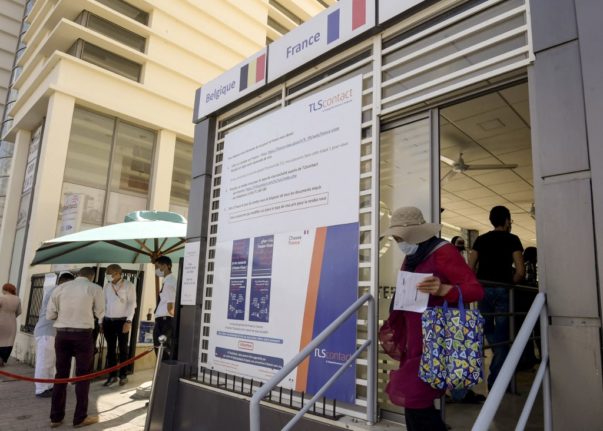Moving to France is undeniably easier if you are covered by EU freedom of movement, for non-EU citizens it’s still very possible, but requires more paperwork.
First things first, unless you are fortunate enough to have dual nationality with an EU country (eg Ireland) you will need a visa in order to come and live in France.
It’s important to note that your visa has to be sorted before you leave your home country. Depending on your nationality you may be able to travel to France visa-free for up to 90 days at a time, but you cannot ‘convert’ your status from tourist to resident while you are in France.
Almost all visas charge processing fees and you need to be prepared to create a big bundle of supporting documents, but the first thing to do is work out the type of visa that you need.
Here’s an overview of the most common types:
Spouse Visa
Contrary to popular belief, being married to a French person doesn’t exempt you from the visa process, but does make things a little easier if you decide to go for a spouse visa – you’ll be able to get a 12-month visa and you’ll have to register at the Immigration Office (OFFI) within three months of arrival. This will count as your residence card (more info on how to get residency later).
The good news is that the application is free but you’ll need a heap of documents including application forms, proof of marriage, proof of your spouse’s nationality, and a residence form. More info here.
Work Visa
If you intend to work in France then you have two options; get a work visa as a salaried employee or get an entrepreneur visa if you intend to set up your own business or work self-employed as a freelancer or contractor.
Employee visa – The toughest part of the employee visa is that you need to find a job first, rather than coming to France and then job-hunting.
Once you find a job, you then need to have your work contract approved by the authorities at the French Labour Ministry (then again at the OFFI offices) and depending on the sector you work in your employer may have to apply for a work permit and justify why they’re hiring you and not a European.
If you’re bringing family on this visa, get the employer to start a file for them at the same time. You’ll need to fill in application forms, residence forms, and you’ll need to pay a processing fee.
Entrepreneur – this applies for people who want to set up their own business (eg run a gîte or B&B) or work in an self-employed capacity including as a freelancer or contractor.
The entrepreneur visa has different requirements, including a detailed business plan and proof of financial means – essentially you need to be able to demonstrate that you can support yourself even if your business idea or freelance career never takes off.
Here 2021 arrival Joseph Keen takes us through the entrepreneur visa: ‘Not too complicated but quite expensive’ – what it’s like getting a French work visa
Visitor Visa
This is for those who want to live in France but don’t have a job, a French spouse, or plans to study – it’s most commonly used by retired people and it brings with it the requirement to have a certain level of assets.
READ ALSO How much money do I need to get a French visa?
You’ll need: filled-in questionnaires and application forms, an undertaking not to work in France (not even working remotely for an employer back in your home country or setting up a gîte or B&B business in France), proof that you can support yourself in France, proof of financial means, proof of medical insurance, proof of accommodation in France, among other things. More info here.
Student visa
The good news is that the fee is around half that of the other long stay visas, at €50, and is usually shorter to process, but the bad news is that it’s no walk in the park.
You’ll need a series of documents from Campus France, financial guarantees and proof of enrolment at a French establishment of higher education. More info here.
Au Pair visa
If you’re between the ages of 17 and 30, don’t mind a few household chores and quite like children, then this year-long visa could be right up your alley.
You’ll need all the usual forms, but also an “au pair contract” approved by the French ministry of labour, an invitation from your host family, and you’ll have to sign up to language courses for while you’re here. Read more about becoming an au pair here, and find out more on the visa info here.
Talent Passport
If you qualify for it, there’s also the ‘talent passport’ which is really the best type of visa because it lasts for four years before you need to renew and you can bring family members on it.
It offers a four-year work visa to people who can demonstrate certain business, creative or academic skills, or who have a provable reputation in their field – for example, scientific, literary, artistic, intellectual, educational, or sporting. The categories were recently expanded and cover quite a wide variety of fields. More info here.
Besides these options, there is always a scientist visa, an internship visa, and a diplomatic visa.
Next steps
Once you have decided which visa you need, you apply online, submitting all the required documents and a fee (usually around €80-€100). You will then need to make an in-person visit to the French consulate in your home country – which will often mean travelling quite some distance from your home to the nearest consulate.
EXPLAINED: How to get a French visa
Processing times for visas vary, but you should allow at least six weeks.
What else?
Once you have secured your visa you’re more or less ready to travel, but there are some other things to check.
Health insurance – some visa types, especially those for people who will not be working, require proof of health insurance. If this is the case you will need to buy a private health insurance (not travel insurance) policy that covers the entire duration of your visa. Depending on your age and state of health these policies can be expensive, so you should factor this in to your financial calculations.
Once you have been living in France for three months, you’re entitled to register in the public health system and get a carte vitale, but the process of getting the card can be quite lengthy, so it’s a good idea to have health cover for these early months even if it’s not a requirement of your visa.
Driving licence – licences issued by most countries can be used in France for an initial period, but you will need to exchange this for a French licence, usually within one year of arrival.
Whether this is a simple swap for a French licence or involves taking a French driving test depends on whether the country that issued your licence has a reciprocal agreement in place with France.
By country: How hard is it to swap your driving licence for a French one?
Bank account – for everyday life in France you will likely need a French bank account, but many French banks require proof of an address, while landlords often won’t rent to you without a French bank account, creating something of a Catch 22.
READ ALSO Everything you need to know about opening a French bank account
Taxes – this is something that often catches people out – if you live in France you need to file an annual tax declaration, even if you have no income in France (eg you are living on a pension from your home country). More details here.
If you still have financial activity in your home country – such as a property rental – you will usually also need to file a tax return there, but while you have all the fun of doing two tax declarations every year, most countries have dual-taxation agreements with France, which means you won’t have to pay tax twice on the same income.
And how to stay in France
But once you’re in France, you might want to stay here. Think that getting your visa represents the end of your French paperwork? Dream on!
Depending on the type of visa you have you may be required to visit OFII (Office Français de l’Immigration et Intégration) on arrival to register and you may be required to undergo a medical examination or to take French classes if your language skills are a little basic.
Other types of visa require you to validate them at your local préfecture within a certain time period.
These ‘in country’ steps are important, so in between popping Champagne when your visa arrives, take the time to read carefully the accompanying documents and note down when you need to take the next steps.
Your visa will also need renewing, most initial visas last for one year, but there are exceptions.
The exact steps vary depending on your visa type, but the most common route is to apply for a residency permit (carte de séjour) so that you can stay longer than just 12 months – you usually apply for this two months before your visa runs out.
We look in more detail at the next steps HERE.
French administration is in the process of moving its immigration system online, but we’re now at the halfway stage where you can apply for some types of cartes de séjour online, but others require a visit to your local préfecture.
Once you’ve been here for five (continuous) years, you’re eligible for long-term residency, which does away with the annual paperwork.
And if you have been here for five continuous years (or three years if you completed higher education in France) and speak good French, then you can apply for French citizenship – if you’re game for a whole lot more paperwork.
READ ALSO Am I eligible for French citizenship?
You can find more details in our Moving to France section.



 Please whitelist us to continue reading.
Please whitelist us to continue reading.
Member comments